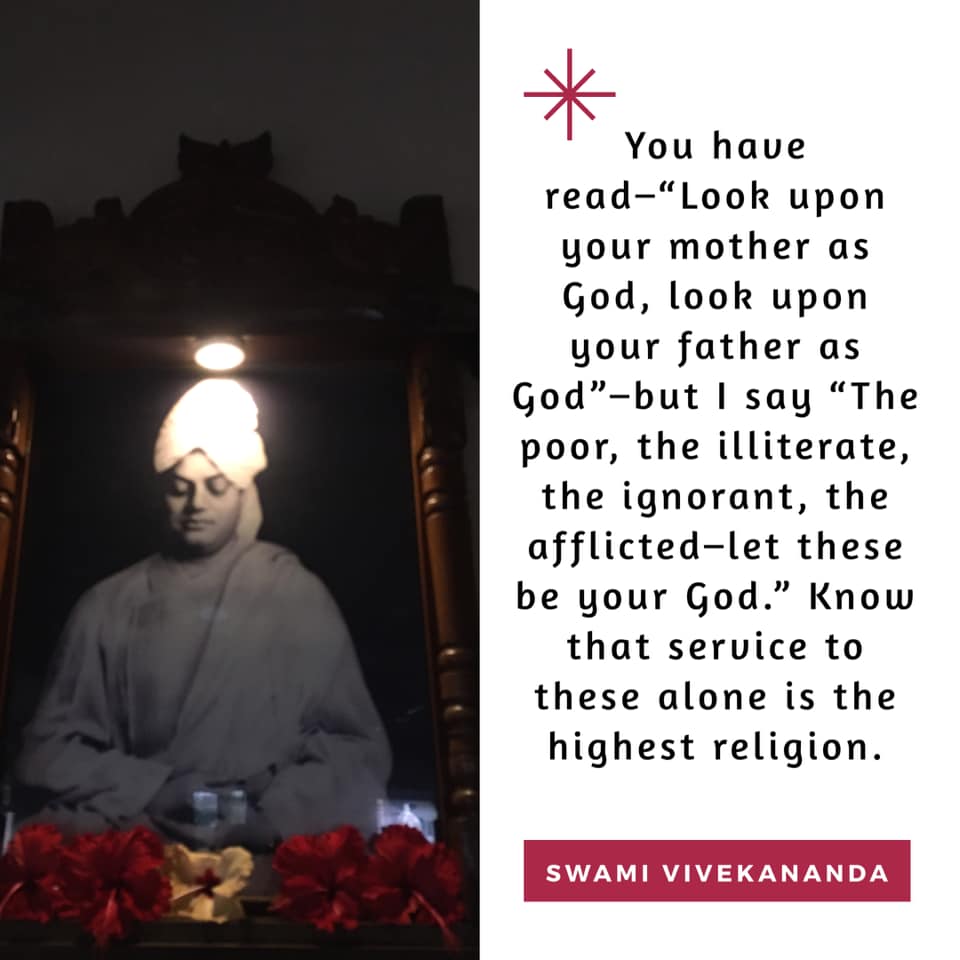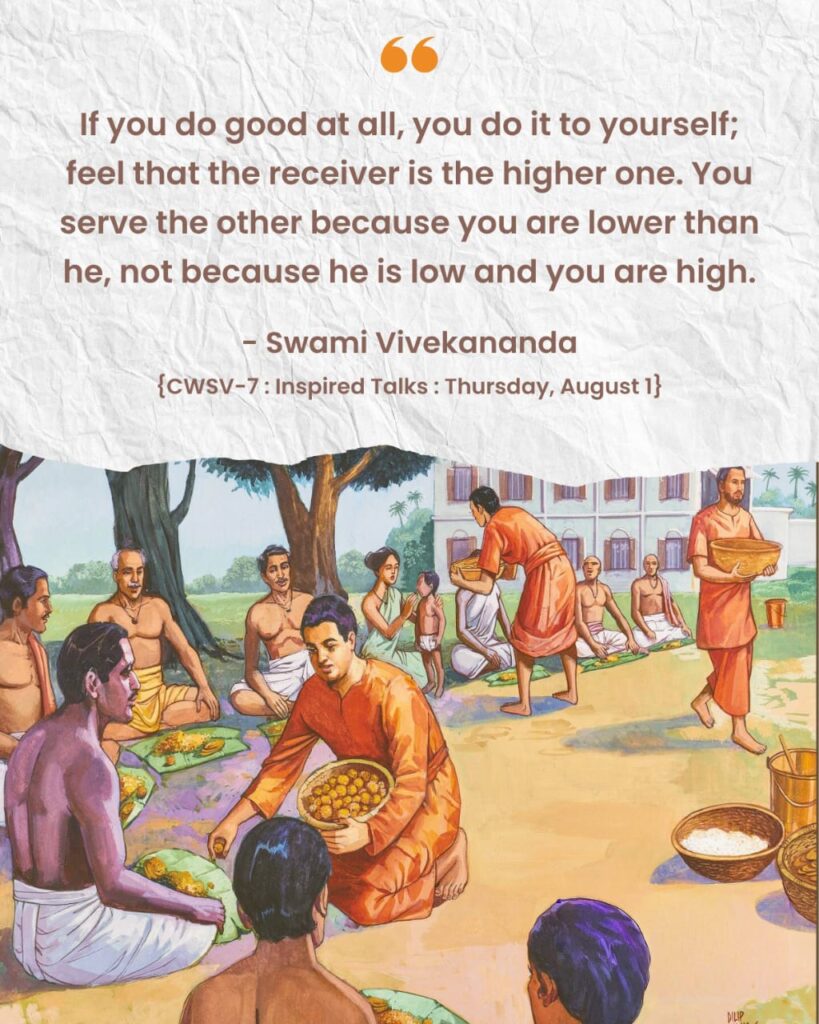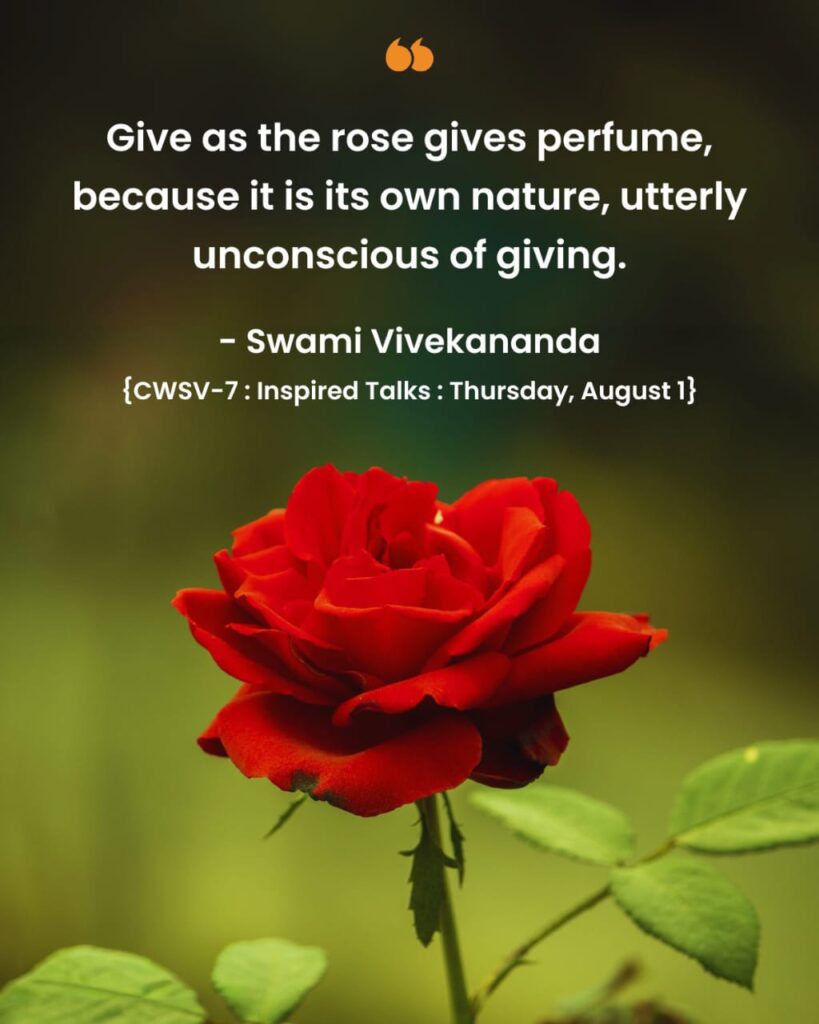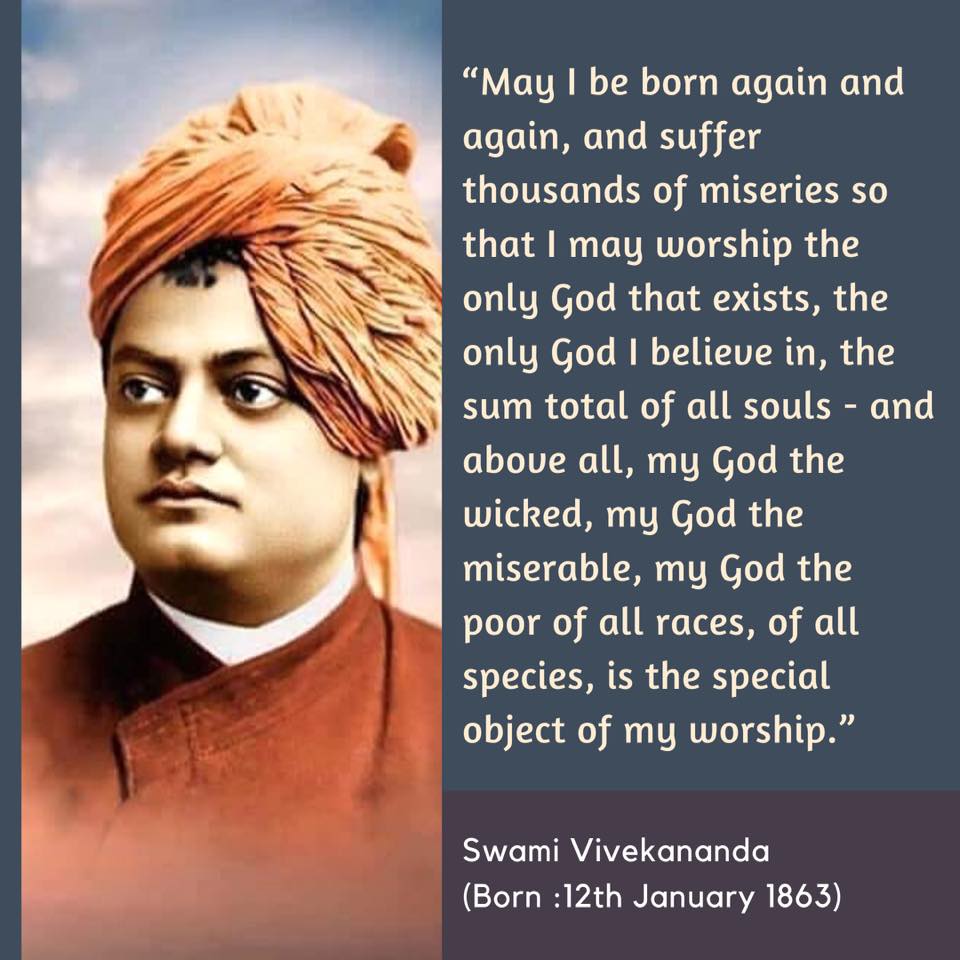One day at Dakshineswar when the Master was seated in his room, he talked about three salient disciplines of the Vaishnava religion: love of God’s name, compassion for all living beings, and service to the devotees. Repeating the word compassion he went into samadhi. After a while he returned to normal consciousness and said to the devotees: “How foolish to speak of compassion! Man is an insignificant worm crawling on the earth — and he is to show compassion to others! This is absurd. It must not be compassion, but service to all. Recognize them as God’s manifestations and serve them.”
Only Narendra understood the implication of the Master ’s words. Leaving the room, he said to the others:
What a wonderful light I have discovered in those words of the Master! How beautifully he has reconciled the ideal of bhakti with the knowledge of Vedanta, generally interpreted as dry, austere, and incompatible with human sentiments! What a grand, natural, and sweet synthesis! … Those following the paths of karma [action] and yoga [contemplation] are similarly benefitted by these words of the Master. The embodied being cannot remain even for a minute without activity. (BG 3.5) All his activities should be directed to the service of man, the manifestation of God upon earth, and this will accelerate his progress towards the goal. If it be the will of God, I shall one day proclaim this noble truth before the world at large. I shall make it the common property of all — the wise and the foolish, the rich and the poor, the brahmin and the pariah. (Source: God Lived with Them)
—–
Vivekananda travelled over almost all of India, mostly on foot, visiting places of history and pilgrimage. He was thus able to gain firsthand experience of the Indian people. Seeing the poor and deplorable conditions of the masses, he was at times moved to tears. He had suffered great poverty himself and had deep compassion for the suffering of others. Once he remarked, with his usual vigour, that a God who could not in this life give a crust of bread was not to be trusted in the next for the kingdom of heaven. He observed that religion was not the crying need of India, and recalled Sri Ramakrishna’s pithy saying, “Religion is not for an empty stomach.”
In his travels, Vivekananda met the Maharajas of Khetri, Alwar, Mysore, Ramnad, and many other dignitaries. He boldly told them that the prosperity of India depended upon uplifting the masses by introducing good education, modern science, and industry. However, they did not show sufficient interest. Later, he expressed his feelings: “May I be born again and again, and suffer thousands of miseries so that I may worship the only God that exists, the only God I believe in, the sum total of all souls — and above all, my God the wicked, my God the miserable, my God the poor of all races, of all species, is the special object of my worship.” (Source: God Lived with Them)
—–
On his way to Bombay Swamiji stopped at the Abu Road Station and met Swamis Brahmananda and Turiyananda. When he told them that he was going to America they were greatly excited. He explained to them: “I have now travelled all over India… . But alas, it was agony to me, my brothers, to see with my own eyes the terrible poverty and misery of the masses, and I could not restrain my tears! It is now my firm conviction that it is futile to preach religion amongst them without first trying to remove their poverty and sufferings. It is for this reason — to find more means for the salvation of the poor of India — that I am now going to America.” (Source: God Lived with Them)
—–
Vivekananda reminded his countrymen to be unselfish and to cultivate love for the masses: “Feel, therefore, my would-be reformers, my would-be patriots! Do you feel? Do you feel that millions and millions of the descendants of gods and of sages have become next-door neighbours to brutes? Do you feel that millions are starving today and millions have been starving for ages? Do you feel that ignorance has come over the land as a dark cloud? Does it make you restless? Does it make you sleepless?
Swamiji wrote:
For the next fifty years let all other vain Gods disappear from our minds. This is the only God that is awake: our own race — everywhere His hands, everywhere His feet, everywhere His ears, He covers everything. All other Gods are sleeping. Why should we vainly go after them, when we can worship the God that we see all around us, the Virat [the Cosmic God]? The first of all worships is the worship of the Virat, of those all around us. These are all our Gods — men and animals; and the first Gods we have to worship are our own countrymen. (Source: God Lived with Them)
—–
Later, Swami Vivekananda disclosed his life’s experience: “After so much tapasya, austerity, I have known that the highest truth is this: He is present in all beings. These are all the manifested forms of Him. There is no other God to seek for! He alone is worshipping God, who serves all beings.” (Source: God Lived with Them)
One morning at 9:00 o’clock Premananda was about to start worship in Belur Math’s old shrine. Swamiji came to the shrine to bow down to the Master. Seeing Premananda, Swamiji said: “Brother, all these days you have been worshipping the Lord with flowers and sandal paste; now start worshipping the living gods. Go to Belur village and serve the poor and the afflicted.” Then Swamiji asked his disciple Brahmachari Nandalal to perform the worship and Premananda left the shrine to obey his leader’s order. In the village he found an old, sick widow and offered her treatment from the monastery’s charitable dispensary; but the woman refused his help. Then he came across a few unwashed children in another area; he brought them to the monastery, cleaned them with soap and water, fed them, and sent them back to their homes. When Premananda was asked, he told Swamiji about his experience, “When I was serving them, I felt I was actually serving the Master through living gods.” (Source: God Lived with Them)
Once a rich man of Calcutta built a Shiva temple in Varanasi, ostensibly to acquire merit. When Vivekananda heard about it, he remarked, “If he would do something to relieve the suffering of the poor, then he would acquire the merit of building a thousand such temples.”
After dedicating the Vivekananda Temple on 28 January 1924 and the Brahmananda Temple on 7 February 1924 in Belur Math, Shivananda left for South India on 7 April with Swamis Sharvananda and Bodhananda. On their way to Madras they stopped in Bhubaneswar and Waltair. One day Shivananda and his party were invited for lunch by a devotee. While leaving the swami noticed some poor people in the alley fighting for the leftover food. Unable to bear it, he asked his host to feed them. Shivananda reminded him of Swamiji’s message: “Make the poor of humanity your God. The service of these living gods is the religion of this age.”
On 27 January 1868, Mathur and Jagadamba left on a pilgrimage to the main holy places of northwestern India with a party of about one hundred and twenty-five people, including the Master and Hriday. One second-class and three third-class railroad cars had been reserved for them with an arrangement with the railway company that they could be detached at any station. Mathur spent more than one hundred thousand rupees on this pilgrimage.
The party first stopped for a few days at Deoghar to visit a famous shrine of Shiva. One day Sri Ramakrishna was overcome with compassion, seeing the miserable condition of the people in a nearby village. He said to Mathur: “You are a steward of Mother’s estate. Give these poor people one piece of cloth and one good meal each, and also some oil for their heads.” But Mathur was reluctant. He said: “Father, this pilgrimage is going to cost a great deal, and there are many people here. If I give them what you ask I may find myself short of money later.” Sri Ramakrishna cried bitterly. “You wretch!” he said. “I’m not going to Varanasi. I’m staying here with these people. They have no one to care for them. I won’t leave them.” Mathur, of course, yielded. He had cloth brought from Calcutta and fulfilled all of the Master’s other requests. Then they continued their journey to Varanasi. (Source: They Lived with God)
—–
It was hard for Mathur to live without Sri Ramakrishna’s holy company, so wherever he went he took the Master with him. Once they took a pleasant boat trip on the Ganges to visit one of Mathur’s estates near Ranaghat, in West Bengal. At Ranaghat Sri Ramakrishna was overwhelmed with grief when he saw the miserable condition of the villagers, and he asked Mathur to feed and clothe them. At first Mathur was reluctant, but later he carried out the Master’s wishes. (Source: They Lived with God)
Sri Ramakrishna wanted to fulfill a special mission through Gauri-ma. He realized that the women of Indian society were terribly neglected, especially in the area of education, and it was his wish that Gauri-ma should work among them. One day he said to her: “The women of Jadu Mallick’s family have been wanting to see you. Please visit them.” But Gauri-ma replied: “That is your business, Father! Why do you praise me so much to others?”
On another occasion Gauri-ma was picking flowers near the nahabat when the Master came there with a pot of water. Holding a branch of the bakul tree with one hand, he began pouring water with the other. Then he said, “Gauri, let me pour water and you knead the mud.” Surprised, Gauri-ma answered: “There is no clay here. How can I knead the mud? This place is full of stone chips.” The Master smiled and said: “My goodness! What I meant and what you have understood! The condition of women in this country is very poor and painful. You will have to work for them.” Gauri-ma did not like the idea, however. “It is hard for me to get along with worldly people,” she told him. “I don’t care for all the hustle and bustle. Give me a few girls, and I shall take them to the Himalayas and mould their character.” But the Master shook his head and said: “No, no. You will have to work in the city. You have practised enough spiritual disciplines. Now you should serve the women with your spiritual energy.”
—–
In 1894 Swami Vivekananda wrote from America to his brother disciples: “If you want any good to come, just throw your ceremonials overboard and worship the Living God, the Man-God — every being that wears a human form — God in His universal as well as individual aspect. Spread ideas — go from village to village, from door to door — then only there will be real work. We want both men and women. There is no distinction of sex in the soul. Where is Gauri-ma? We want a thousand such mothers with that noble stirring spirit.” In Vrindaban the Holy Mother had also reminded Gauri-ma: “The Master said that your life was meant for serving women — the living goddesses.”
—–
Although she was a penniless nun, her faith in the Master brought success. It is one’s actions that make one great, not one’s name. Great people are few in this world, and Gauri-ma was truly one of them. Once the Holy Mother said to a devotee about her: “Gaur-dasi takes wonderful care of the girls at her ashrama. If anyone is ill, she does all her personal services herself. She never had to do these things before, but the Master is making her do them this time, this being her last birth.” (Source: They Lived with God)
Devendra continued as manager of the Devnarayan Estate until 1907, but after that he spent all of his time spreading the message of the Master. He had quite a few disciples, who greatly loved and respected him. He also inspired many young people to follow Swamiji’s teaching to “serve man as God.” One of Devendra’s followers, Nafar Chandra Kundu, used to go to the Archanalaya every evening after work in order to be in Devendra’s holy company. One day Devendra asked him, “If you saw that a boy was about to drown in a pond, what would you do?” “I would immediately jump into the pond and try to save him,” replied Nafar. Devendra then explained to him that unselfish action is the same as worshiping God. It so happened that on 12 May 1907, when Nafar was on his way to work in South Calcutta, he came across a large crowd gathered in the street. On inquiry he learned that two Muslims had fallen unconscious while cleaning inside a manhole. He was shocked. He scolded the crowd, “Two men are dying and you people are watching the fun!” Nafar then jumped into the manhole to rescue the men, saying, “Victory to the guru!” Unfortunately the poisonous gas inside the manhole killed Nafar.
Devendra was stunned when he heard the news of Nafar’s death. He praised his bravery and unselfishness. The government of India, the Calcutta Corporation, the Oxford Mission, and many other philanthropic organizations and prominent people of Calcutta organized a committee to set up a monument where Nafar had died and to create a permanent fund that would provide a pension for Nafar’s family. Devendra was the chief planner and worker on the committee. One day at that time Girish Ghosh said to Devendra, “If Swamiji were alive, he would appreciate your contribution.” (Source: They Lived with God)
This doctrine of the Service of Nara-Narayana, or Man as God, initiated by Swamiji (Swami Vivekananda) is an entirely new thing. It is radically different from the humanitarian service performed by the Bhikshus of the Buddhist period, or conducted by the Roman Catholic monks of the Middle Ages. The service of suffering humanity performed by the Buddhist monks was inspired by mercy and compassion, and as a means of helping them in their attainment of Nirvana. Such service done by the Catholic monks was also prompted by mercy and compassion. But in such methods of service, the idea of distinction between Sevya-Sevaka, or the served and the server, is unavoidable. Those who serve in this way place themselves on a higher pedestal and hold it to be the duty of the served to be grateful to them. But service of the “afflicted Narayanas and the poor-Narayanas”—words coined by Swamiji—based on the idea of Advaita or oneness of the Upanishads, as proclaimed by him, makes no difference between the giver and the recipient, for they are one from the standpoint of the Atman. Besides that, because the recipients afford the Sevakas the opportunity as well as the right and privilege of serving them as Narayana, the latter should rather feel grateful to them. Swamiji has even said, “Let the giver kneel down and worship, let the receiver stand up and permit!” What a world of difference between the old and the new idea! (Source: Towards the Goal Supreme by Swami Virajananda)
Swami Vivekananda Says —
- Let the poor, the illiterate, the ignorant, the afflicted—be your God. Know that service to these alone is the highest religion.






Related Articles: